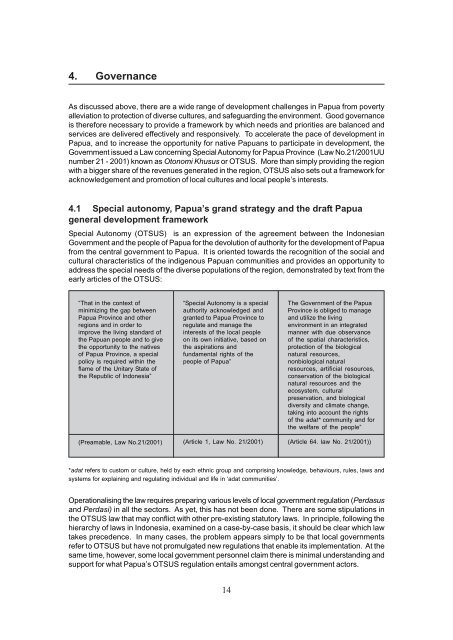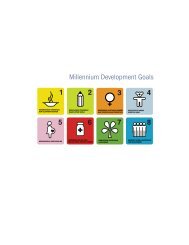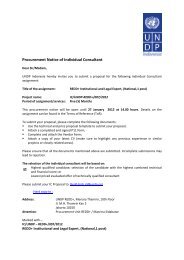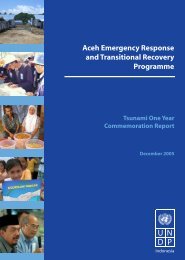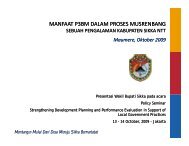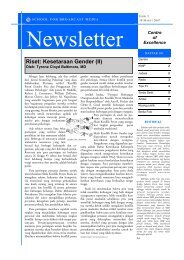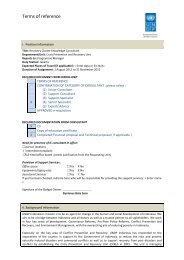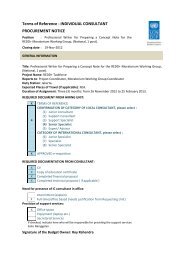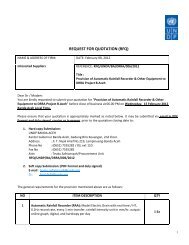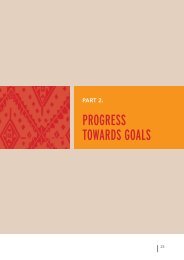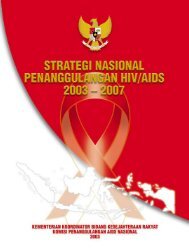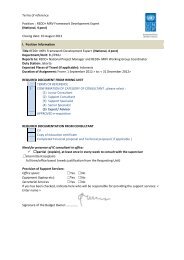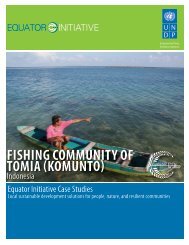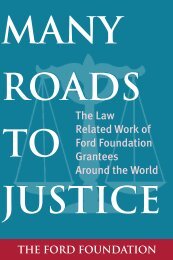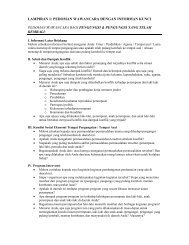Papua Needs Assessment - UNDP
Papua Needs Assessment - UNDP
Papua Needs Assessment - UNDP
Create successful ePaper yourself
Turn your PDF publications into a flip-book with our unique Google optimized e-Paper software.
4. Governance<br />
As discussed above, there are a wide range of development challenges in <strong>Papua</strong> from poverty<br />
alleviation to protection of diverse cultures, and safeguarding the environment. Good governance<br />
is therefore necessary to provide a framework by which needs and priorities are balanced and<br />
services are delivered effectively and responsively. To accelerate the pace of development in<br />
<strong>Papua</strong>, and to increase the opportunity for native <strong>Papua</strong>ns to participate in development, the<br />
Government issued a Law concerning Special Autonomy for <strong>Papua</strong> Province (Law No.21/2001UU<br />
number 21 - 2001) known as Otonomi Khusus or OTSUS. More than simply providing the region<br />
with a bigger share of the revenues generated in the region, OTSUS also sets out a framework for<br />
acknowledgement and promotion of local cultures and local people’s interests.<br />
4.1 Special autonomy, <strong>Papua</strong>’s grand strategy and the draft <strong>Papua</strong><br />
general development framework<br />
Special Autonomy (OTSUS) is an expression of the agreement between the Indonesian<br />
Government and the people of <strong>Papua</strong> for the devolution of authority for the development of <strong>Papua</strong><br />
from the central government to <strong>Papua</strong>. It is oriented towards the recognition of the social and<br />
cultural characteristics of the indigenous <strong>Papua</strong>n communities and provides an opportunity to<br />
address the special needs of the diverse populations of the region, demonstrated by text from the<br />
early articles of the OTSUS:<br />
“That in the context of<br />
minimizing the gap between<br />
<strong>Papua</strong> Province and other<br />
regions and in order to<br />
improve the living standard of<br />
the <strong>Papua</strong>n people and to give<br />
the opportunity to the natives<br />
of <strong>Papua</strong> Province, a special<br />
policy is required within the<br />
flame of the Unitary State of<br />
the Republic of Indonesia”<br />
(Preamable, Law No.21/2001)<br />
“Special Autonomy is a special<br />
authority acknowledged and<br />
granted to <strong>Papua</strong> Province to<br />
regulate and manage the<br />
interests of the local people<br />
on its own initiative, based on<br />
the aspirations and<br />
fundamental rights of the<br />
people of <strong>Papua</strong>”<br />
(Article 1, Law No. 21/2001)<br />
The Government of the <strong>Papua</strong><br />
Province is obliged to manage<br />
and utilize the living<br />
environment in an integrated<br />
manner with due observance<br />
of the spatial characteristics,<br />
protection of the biological<br />
natural resources,<br />
nonbiological natural<br />
resources, artificial resources,<br />
conservation of the biological<br />
natural resources and the<br />
ecosystem, cultural<br />
preservation, and biological<br />
diversity and climate change,<br />
taking into account the rights<br />
of the adat* community and for<br />
the welfare of the people”<br />
(Article 64. law No. 21/2001))<br />
*adat refers to custom or culture, held by each ethnic group and comprising knowledge, behaviours, rules, laws and<br />
systems for explaining and regulating individual and life in ‘adat communities’.<br />
Operationalising the law requires preparing various levels of local government regulation (Perdasus<br />
and Perdasi) in all the sectors. As yet, this has not been done. There are some stipulations in<br />
the OTSUS law that may conflict with other pre-existing statutory laws. In principle, following the<br />
hierarchy of laws in Indonesia, examined on a case-by-case basis, it should be clear which law<br />
takes precedence. In many cases, the problem appears simply to be that local governments<br />
refer to OTSUS but have not promulgated new regulations that enable its implementation. At the<br />
same time, however, some local government personnel claim there is minimal understanding and<br />
support for what <strong>Papua</strong>’s OTSUS regulation entails amongst central government actors.<br />
14


